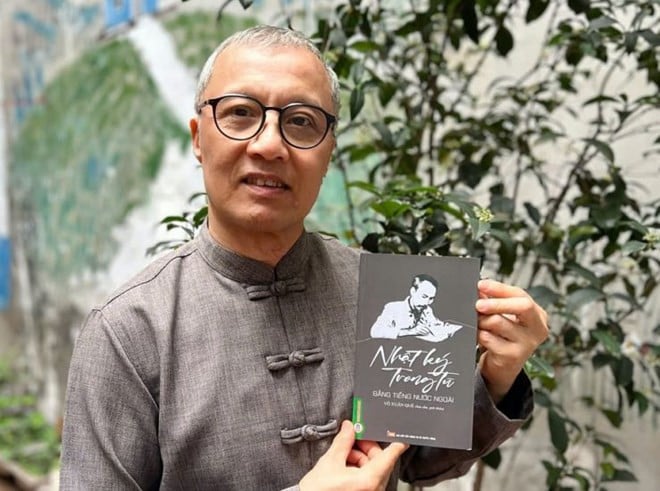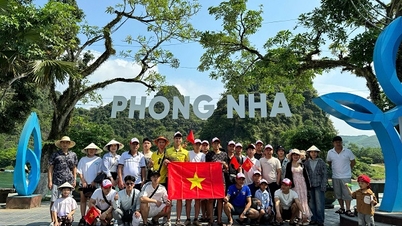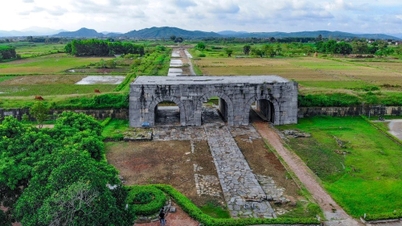Transcending all boundaries of time and space, President Ho Chi Minh 's poetry collection "Prison Diary" not only moves the hearts of Vietnamese people but also touches the emotions of readers worldwide.

Author Vo Xuan Que's collection of foreign translations is vivid evidence of the enduring vitality and lasting humanistic and artistic value of these works.
A journey spanning over half a century, spreading to five continents.
"Prison Diary"—a collection of poems written by President Ho Chi Minh during his imprisonment in Chiang Kai-shek's prison (1942-1943)—is a symbol of unwavering will, humanitarian spirit, and revolutionary intellect. With 133 poems in Chinese characters, the work expresses optimism, patriotism, a yearning for freedom, and compassion for humanity.
From its humble handwritten manuscript, the poetry collection has been translated into at least 37 languages with 62 translations by 79 translators worldwide – according to the compilation by Dr. Vo Xuan Que. Each translation not only translates the text but also conveys the depth of thought, emotion, and humanistic values of the poems, reflecting the respect of international friends for President Ho Chi Minh.
Author Vo Xuan Que, who has spent many years researching, collecting, and introducing translations of "Prison Diary," said that accessing all 62 translations was no easy task due to limited costs, time, and personal resources. However, he has tried to gather as much information as possible about the translation titles, translators, publishers, publication years, and the number of poems or pages – valuable data that will help researchers and interested readers to research, learn, and continue to supplement the collection.
One of the interesting things he discovered was that there were three different Spanish translations of "Prison Diary," instead of just one as Vietnam had previously known (translated by a Cuban poet). There were even two translations in minority languages in Spain: Basque and Galician. These cultural regions, geographically and traditionally very distant from Vietnam, showed particular interest in a poetic work by a revolutionary leader from the East.
A different perspective from international readers.
Beyond simply spreading the image of President Ho Chi Minh as a revolutionary, the translations of "Prison Diary" have also helped international readers recognize another aspect of him – a poet, an artist with a sensitive heart, profound intellect, and a philosophical way of thinking about life. This is clearly demonstrated through the articles, introductions, and accompanying reviews in many of the translations.
For example, in 1968, The Nation (USA) published an article titled: "The Vietnamese leader is also a poet," from the English translation of "Prison Diary." This was a critical period in the Vietnam War, yet Americans still found in President Ho Chi Minh's poems a value that transcended the battle lines – humanity, art, the beauty of freedom, and unwavering resilience in the face of adversity.
The couple who translated the Polish version, in the preface to their translation, wrote: "With short poems, often only four lines long, Ho Chi Minh painted realistic pictures of his own suffering and that of his fellow prisoners in a humorous and profound way. His concise poems are miniature masterpieces."
Meanwhile, the Galician translator, who took seven years to complete the translation, shared: "Despite suffering, illness, and the horrors surrounding him, Ho Chi Minh still found the strength to write optimistic and humorous poems. These short poems were skillfully woven together in the darkness of his prison cell. The poet and the revolutionary were one and the same."
"Prison Diary" is not only a work of exceptional artistic and historical value for Vietnam, but also a poetic heritage of international stature. The dedicated translations by translators worldwide have contributed to bringing the image of Ho Chi Minh – the poet and humanist – closer to humanity.
Vo Xuan Que's work "Prison Diary" in a foreign language (Information & Communications Publishing House, March 2025) is a significant contribution to literature, history, culture, and people-to-people diplomacy . The work opens a new approach to studying Ho Chi Minh's legacy, affirming the poem's global standing in the world's literary treasury.
Source



![[Photo] Prime Minister Pham Minh Chinh presides over a meeting on private sector economic development.](/_next/image?url=https%3A%2F%2Fvphoto.vietnam.vn%2Fthumb%2F1200x675%2Fvietnam%2Fresource%2FIMAGE%2F2025%2F12%2F20%2F1766237501876_thiet-ke-chua-co-ten-40-png.webp&w=3840&q=75)






























































































Comment (0)